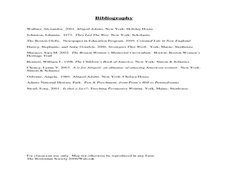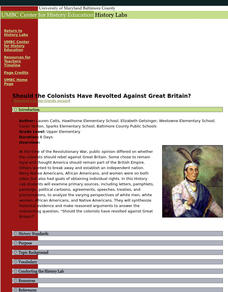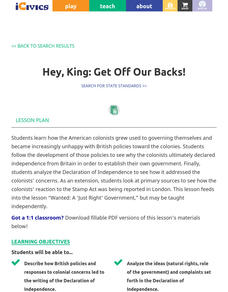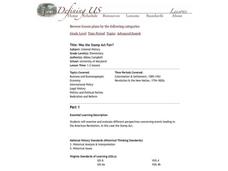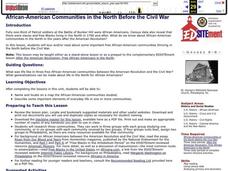Curated OER
"I Cannot Tell a Lie"
Young scholars examine and debunk historical myths, using the American Revolution as a starting point. They create and play a game of "American History: Fact or Fiction?"
Curated OER
Abigail Adams: Integrating Social Studies and Language Arts
Third graders increase reading strategies while learning about Abigail Adams and her role in history. In this Abigail Adams lesson, 3rd graders read about the American Revolution and Abigail Adams using all the balanced literacy...
Curated OER
Philanthropic Movements in the United States to 1900: 1765 to the Declaration of Independence
Students watch and discuss the Johnny Tremain video. They discuss the actions of citizens during the American Revolution and describe these actions as patriotic and/or philanthropic.
Curated OER
Patriot Women
Students explore the significance of women's roles in the American Revolution through reading selections and brainstorming.
Curated OER
1765 to the Declaration of Independence
Students research philanthropists of the American Revolution. In this philanthropy lesson, students watch the video Johnny Tremain and analyze the characters and determine their motives. Students read the Declaration of Independence...
Curated OER
Johnny Tremain for the 21st Century
Seventh graders complete a unit of lessons on the American Revolution based on the novel, 'Johnny Tremain.' They define key vocabulary terms, develop a timeline, write a report on a colonial craft, make a colonial flag, and create a...
Curated OER
A Little Rebellion Now and Then Leads to Archival Material
Students examine the American Revolution and the Articles of Confederation. They, in groups, participate in different activities.
Curated OER
Gather the Stones!
Review how gristmills affected the lives of the Pennsylvania community. The class uses documents and pictures to explore the purpose of the gristmill. They simulate members of the community and write a paper about colonial forces...
Curated OER
Classroom Newspaper
Fifth graders study the American Revolution. In this writing lesson, each group of students write a story that will go into the created newspaper depicting a day in the 1770's.
Center for History Education
Should the Colonists Have Revolted Against Great Britain?
Should the Americans have taken the plunge and revolted against Great Britain? Using documents, including the famed Common Sense and a Loyalist response, pupils conduct a lengthy investigation of the question. The interesting resource...
iCivics
Hey, King: Get Off Our Backs!
Young historians explore the reason American colonists were unhappy under British rule. Class members complete hands-on activities and participate in a group discussions to understand why colonists drafted the Declaration of Independence.
Library of Congress
Industrial Revolution
Could you live without your phone? What about cars, steel, or clothing? Class groups collaborate to produce presentations that argue that either the telephone, the gramophone, the automobile, the textile industry, or the steel...
Curated OER
Was the Stamp Act Fair?
Elementary and middle schoolers examine and evaluate different perspectives concerning events leading to the American Revolution. In this case, they hone in on the Stamp Act. They research controversial bills, laws, or events of the time...
Curated OER
We The People: A History
Students play a game about taxation where they have tax collectors that simulate the feelings and reasons that led to the American Revolution. In this taxation lesson plan, students learn about why the people in the colonies were so...
Curated OER
Introduction to 18th Century Artisans
Pupils investigate colonial artisans. In this history lesson, students create a booklet of American Artisans and dress up in 18th century clothing for an oral presentation.
National Park Service
The Power of Remembrance
On every July 4th, we watch fireworks and celebrate our independence, but how is the history of the American Revolution preserved? Four social studies lesson guide learners through different memorials, commemorative objects, and restored...
Elizabeth Murray Project
Colonial Women During the Revolution
Young researchers use the Internet or books to find out about colonial women during the American Revolution. They organize information in a graphic to demonstrate their understanding of the research they gathered before writing a...
Curated OER
Lesson: Allison Smith: What Are You Fighting For?
Trench art is a nontraditional art form created by soldiers in trenches during wartime. Artist Allison Smith connects her art to the American Revolution and the question: "What are you fighting for?" Kids examine her art, how it connects...
Pulitzer Center
Revolution in Tunisia
How much do your pupils really know about the revolution in Tunisia? In order to inform your class and spark discussion, first create a country profile, comparing and contrasting Tunisia with the United States. Learners then analyze the...
Curated OER
Why were Americans upset with the British Government?
Fourth graders examine the Revolutionary War in New York State. In this experiential hook instructional activity, 4th graders adhere to new rules imposed by the teacher. Students document their feelings and frustrations with being...
Curated OER
Past Imperfect: Examining Secondary Sources of the American Revolution
Ninth graders respond in essay form to the following writing prompt. Mel Gibson, star of The Patriot, is quoted as stating, "If one were to adhere to historical accuracy all the way, you'd probably have the most boring two hours on...
Curated OER
African-American Communities in the North Before the Civil War
Students examine what life was like in free African-American communities before the Civil War. They analyze maps, identify elements of everyday life in these communities, explore various websites, and complete a chart.
Jamestown-Yorktown Foundation
How Did Relations between Britain and the Colonies Change after the French and Indian War?
What does the French and Indian War have to do with the American Revolution? Following the war, Britain issued the Proclamation of 1763 in an attempt to limit the colonists' western expansion. To understand how the proclamation, the...
Center for History Education
How Did the Public View Women’s Contributions to the Revolutionary War Effort?
Calling upon the legacies of Joan of Arc, Elizabeth I, and Catherine the Great, Esther Reed rallied Southern women to support the American Revolution. Using a broadside by Reed and other primary sources, such as poetry, young historians...
Other popular searches
- American Revolutionary War
- American Revolution Causes
- American Revolution Projects
- The American Revolution
- American Revolution Battles
- Mind Map American Revolution
- Road to American Revolution
- American Revolution Women
- American Revolutionary Figures
- American Revolution Music
- Causes of American Revolution
- Latin American Revolutions

